
Floresta e Ambiente
Scope & Guideline
Empowering knowledge for a sustainable future in forestry.
Introduction
Aims and Scopes
- Agroforestry and Land Management:
Research examining the integration of trees and shrubs into agricultural landscapes, focusing on sustainable practices, soil health, and productivity enhancement. - Forest Ecology and Biodiversity:
Studies on the composition, structure, and dynamics of forest ecosystems, including the assessment of species diversity and ecological interactions. - Wood Science and Technology:
Investigations into the properties of wood and wood-based products, including durability, mechanical performance, and the use of innovative materials. - Environmental Impact and Conservation:
Research addressing the effects of anthropogenic activities on forest ecosystems, including pollution, habitat loss, and restoration strategies. - Climate Change and Carbon Dynamics:
Studies exploring the role of forests in carbon sequestration, including the impact of environmental changes on forest health and productivity.
Trending and Emerging
- Sustainable Materials and Eco-composites:
Research on the development of eco-friendly materials, such as bio-composites and the use of agricultural waste, is on the rise, reflecting an emphasis on sustainability in material science. - Urban Forestry and Green Infrastructure:
There is a growing trend towards studies addressing urban forestry, green spaces, and their role in enhancing urban environments and mitigating climate change effects. - Restoration Ecology and Climate Resilience:
Research focusing on the restoration of degraded ecosystems and enhancing resilience to climate change has gained prominence, highlighting the importance of restoring ecological functions. - Soil Health and Agroecology:
An increasing number of studies examine soil attributes and health within agroecological frameworks, emphasizing the interplay between soil management and sustainable agriculture. - Technological Advances in Forestry Research:
The use of advanced technologies, including GIS and remote sensing for monitoring forest dynamics and health, is becoming more prevalent in recent publications.
Declining or Waning
- Traditional Forestry Practices:
Research on conventional forestry methods appears to be waning, possibly due to a growing interest in sustainable and innovative practices that prioritize ecological balance. - Invasive Species Management:
Studies specifically targeting invasive species and their management strategies have decreased, as the focus shifts towards broader ecological restoration and biodiversity conservation efforts. - Pesticide Use and Chemical Treatments:
There is a noticeable reduction in papers addressing the use of chemical treatments in forestry, reflecting a shift towards organic and integrated pest management practices.
Similar Journals

Scientia Forestalis
Connecting scholars and practitioners for impactful forestry studies.Scientia Forestalis is a prominent academic journal dedicated to advancing the field of forestry and environmental studies. Established in 1996 and published by the Instituto de Pesquisa e Estudos Florestais (IPEF) in Brazil, this journal provides a critical platform for researchers and practitioners to disseminate innovative studies and findings in forestry. With an HIndex reflective of its academic impact and ranking in the third quartile of forestry journals, Scientia Forestalis is positioned to cater to a diverse audience, including scholars, professionals, and students engaged in agricultural and biological sciences. Despite its non-open access model, the journal maintains a commitment to high-quality research that fosters an understanding of forest ecosystems and sustainable practices. Published articles span a wide range of topics, ensuring that crucial developments in forestry science are captured and shared. The journal's current Scopus rank places it within the 26th percentile, affirming its role in shaping forestry research in a global context, making it an essential resource for anyone interested in this vital field.

Journal of Forest Science
Empowering global forestry through open access.Journal of Forest Science, published by the Czech Academy Agricultural Sciences, serves as a pivotal resource in the field of forestry and soil science. With its ISSN 1212-4834 and E-ISSN 1805-935X, this Open Access journal has been delivering insightful research since 2003, making knowledge freely available to researchers and practitioners globally. Hailing from the Czech Republic, the journal has established a notable impact within the academic community, as evidenced by its placements in the Q2 quartile for Forestry and Q3 for Soil Science according to the latest rankings. This positions the Journal of Forest Science favorably within academic discourse, ranking #73 out of 174 in Forestry and #84 out of 159 in Soil Science on Scopus, placing it at the 58th and 47th percentiles respectively. Covering a wide range of topics that intersect with environmental sustainability, forest management, and ecological research, the journal aims to foster innovation and collaboration within the scientific community. Researchers, professionals, and students can access published articles easily, bolstering the advancement of knowledge in forest science and its related disciplines.
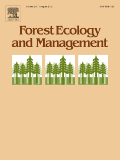
FOREST ECOLOGY AND MANAGEMENT
Navigating the Future of Forest ManagementFOREST ECOLOGY AND MANAGEMENT is a premier peer-reviewed journal dedicated to the integral study of forest ecosystems and their management, published by Elsevier in the Netherlands. With an impactful presence in the field, this journal boasts a prestigious Q1 ranking in multiple categories, including Forestry, Management, Monitoring, Policy and Law, and Nature and Landscape Conservation as of 2023. It addresses key issues relevant to sustainable forest practices, conservation strategies, and environmental monitoring, making it a vital resource for researchers, practitioners, and policymakers alike. The journal is indexed with an impressive Scopus rank, placing it among the top tier of titles in Agricultural and Biological Sciences and Environmental Science. While it does not offer Open Access options, its rigorous review process and high visibility make it essential for those seeking to stay abreast of the latest findings and trends in forest ecology and management. Published continuously since 1976, FOREST ECOLOGY AND MANAGEMENT aims to foster interdisciplinary collaboration and advance knowledge critical to the stewardship of forest resources in an ever-changing global landscape.
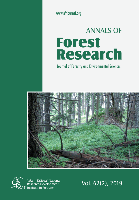
Annals of Forest Research
Innovating research for a greener tomorrow.Annals of Forest Research is a peer-reviewed journal dedicated to advancing knowledge in the fields of forestry, ecology, and plant sciences. Published by EDITURA SILVICA in Romania, this journal has been an open access publication since 2008, providing a platform for researchers to share their insights and findings with a global audience. The journal operates under a rigorous selection process, reflected in its positioning within the Q2 category in Forestry and Q3 in both Ecology and Plant Science as of 2023. With Scopus rankings indicating a solid percentile among its peers, Annals of Forest Research continues to play a vital role in disseminating innovative research and fostering scholarly dialogue. Researchers, professionals, and students are encouraged to explore its diverse range of articles, which address both foundational and contemporary issues in forest management and environmental sustainability, contributing to the sustainable use and preservation of forest ecosystems.
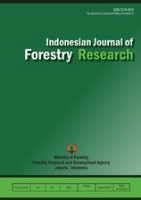
Indonesian Journal of Forestry Research
Exploring the future of forestry and environmental management.The Indonesian Journal of Forestry Research is a distinguished, peer-reviewed academic journal published by the Ministry of Environment & Forestry of Indonesia. With an ISSN of 2355-7079 and E-ISSN 2406-8195, this journal has been an Open Access platform since 2014, fostering international collaboration and knowledge sharing in the fields of ecology and forestry. As of 2023, the journal holds a respectable Q3 category in both Ecology and Forestry, reflecting its contribution to the science community. It ranks #99/174 in Forestry and #305/461 in Ecology in Scopus, indicating its growing influence in the respective fields. Aimed at researchers, professionals, and students, the Indonesian Journal of Forestry Research provides vital insights and findings, supporting sustainable forestry practices and environmental management in Indonesia and beyond. With an emphasis on innovative methodologies and applied research, this journal stands as a pivotal resource for those dedicated to advancing forestry science and ecological research.
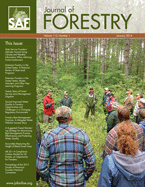
JOURNAL OF FORESTRY
Advancing sustainable forestry through cutting-edge research.JOURNAL OF FORESTRY, published by OXFORD UNIV PRESS INC, is a premier academic journal dedicated to advancing the field of forestry and plant sciences. With a distinguished history dating back to 1919, the journal has evolved to address contemporary challenges and innovations in these critical domains of environmental science. As evidenced by its impressive Q1 rankings in both Forestry and Plant Science categories for 2023, the journal is recognized for its contribution to scholarly research, occupying a significant position among its peers with a Scopus rank of #33 in Forestry and #122 in Plant Science. Researchers and practitioners can access the journal’s articles to stay updated on cutting-edge research, methodologies, and practices that influence sustainable forest management and conservation efforts. By fostering interdisciplinary collaboration, the JOURNAL OF FORESTRY plays a pivotal role in shaping the discourse surrounding forest ecosystems, promoting the integration of science with practice, and facilitating knowledge transfer in academia and industry. As a vital resource for researchers, professionals, and students alike, this journal serves as an essential platform for disseminating high-quality research that addresses pressing environmental concerns.

FOREST SCIENCE
Empowering the future of forest management.FOREST SCIENCE, published by Oxford University Press Inc, is a pivotal journal in the field of forestry and ecological modeling, boasting an impressive track record since its inception in 1970. With an ISSN of 0015-749X and E-ISSN 1938-3738, the journal provides a valuable platform for the dissemination of high-quality research and studies that address contemporary challenges in forestry and ecology. It ranks in the Q2 category for both ecology and forestry and holds a Q3 ranking in ecological modeling according to the latest evaluations, illustrating its significant contribution to these fields. The journal is accessible through various options, facilitating broad readership and engagement within the academic community. As part of its commitment to advancing knowledge and practices in forest management and conservation, FOREST SCIENCE seeks to bridge theoretical research with practical applications, making it an indispensable resource for researchers, professionals, and students alike.
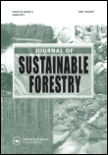
Journal of Sustainable Forestry
Transforming forestry practices for ecological balance.Journal of Sustainable Forestry is a premier academic publication dedicated to advancing knowledge and practices in the field of sustainable forestry and environmental management. Published by Taylor & Francis Inc in the United Kingdom, this journal has been a cornerstone for researchers and professionals since its inception in 1992. With an impressive reputation, it boasts a 2023 Q2 ranking in Food Science, Forestry, and Geography, Planning and Development, highlighting its significant contribution to interrelated disciplines. The journal’s impact is further underscored by its Scopus ranking, especially in Forestry where it holds the 43rd position out of 174 publications, placing it in the 75th percentile. Although not open access, the journal remains committed to providing innovative research and practical insights into forest management, ecological sustainability, and policy development. As the field of sustainable forestry continues to evolve, the Journal of Sustainable Forestry serves as an essential resource for those committed to advancing sustainable practices globally, fostering a deeper understanding of how sustainable forestry can contribute to environmental resilience and biodiversity conservation.

NEW FORESTS
Advancing the Science of Sustainable Forestry.NEW FORESTS, published by SPRINGER, stands at the forefront of forestry research, delivering cutting-edge insights into forest science, management, and conservation. With an ISSN of 0169-4286 and an E-ISSN of 1573-5095, this esteemed journal has earned a distinguished reputation as it continues to contribute significantly to the field since its inception in 1986. As evidenced by its impressive ranking in the Q1 category for Forestry and being positioned at #32/174 in the Scopus Ranks for Agricultural and Biological Sciences, NEW FORESTS maintains an 81st percentile standing, emphasizing its influential role in advancing scientific discourse. The journal focuses on a diverse array of topics within the realm of forestry, making it an essential resource for researchers, professionals, and students eager to engage with contemporary developments and challenges in forest ecosystems. Although it is not an open-access journal, access to its articles can be facilitated through various academic institutions and libraries, ensuring that vital research is available to a broad audience. As we look toward the future, NEW FORESTS continues to strive for excellence, fostering dialogue and collaboration among scholars committed to sustainable forest management and restoration until at least 2024.
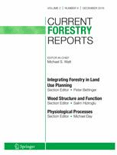
Current Forestry Reports
Advancing sustainable forestry research for a greener tomorrow.Current Forestry Reports, published by Springer International Publishing AG, stands at the forefront of forestry and ecological research, boasting an impressive array of quartile rankings in 2023 such as Q1 in Ecology and Forestry. With an ISSN of 2198-6436, this journal has emerged as a pivotal platform for disseminating innovative research findings and insights critical to the sustainable management of forest ecosystems. Operating out of Switzerland, it covers a broad scope that spans from ecological theory to practical forestry applications and landscape conservation. Notably, it ranks #3 out of 174 in Agricultural and Biological Sciences: Forestry and #4 out of 211 in Environmental Science: Nature and Landscape Conservation, reflecting its high impact and relevance in the field, placing it in the top percentiles in multiple categories. This open-access journal endeavors to provide a comprehensive understanding of contemporary issues, trends, and methodologies in forestry and related disciplines, making it an indispensable resource for researchers, practitioners, and students who are dedicated to advancing knowledge and practices in forest science.